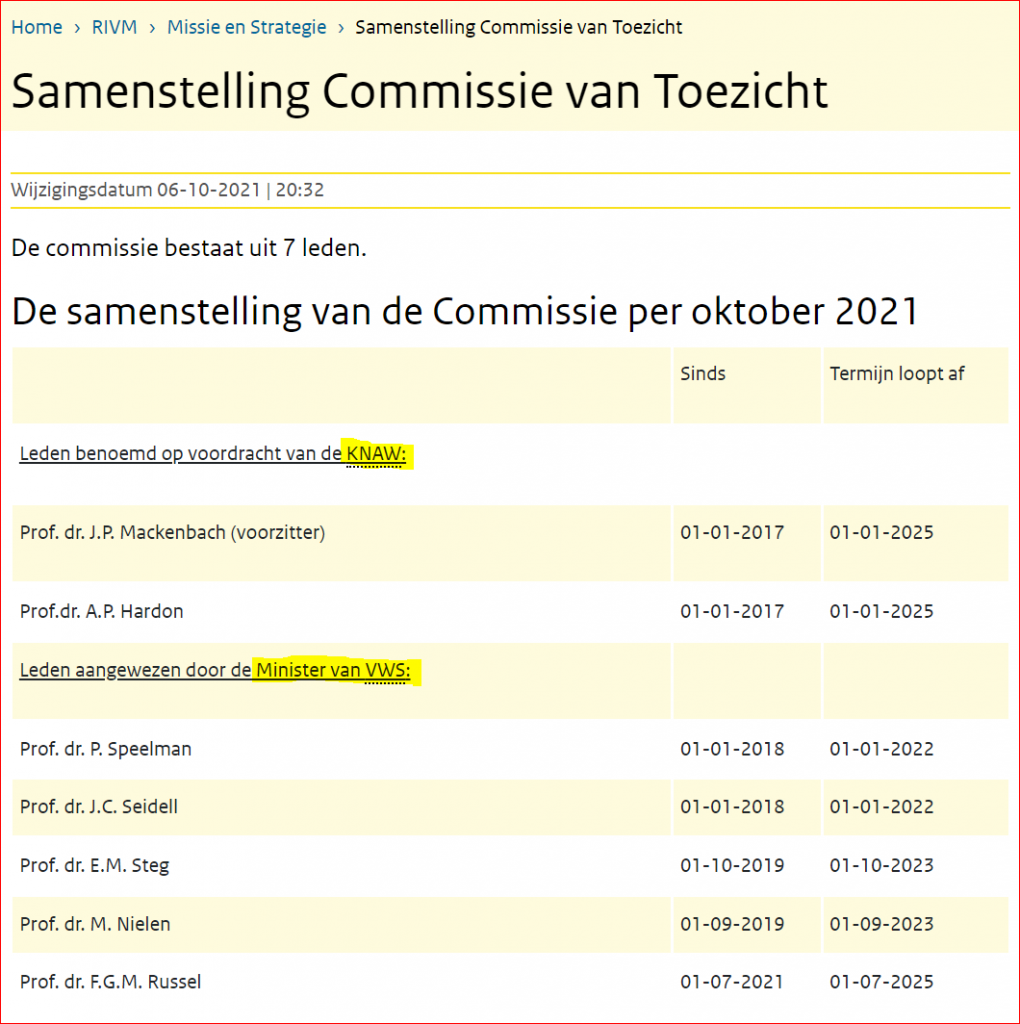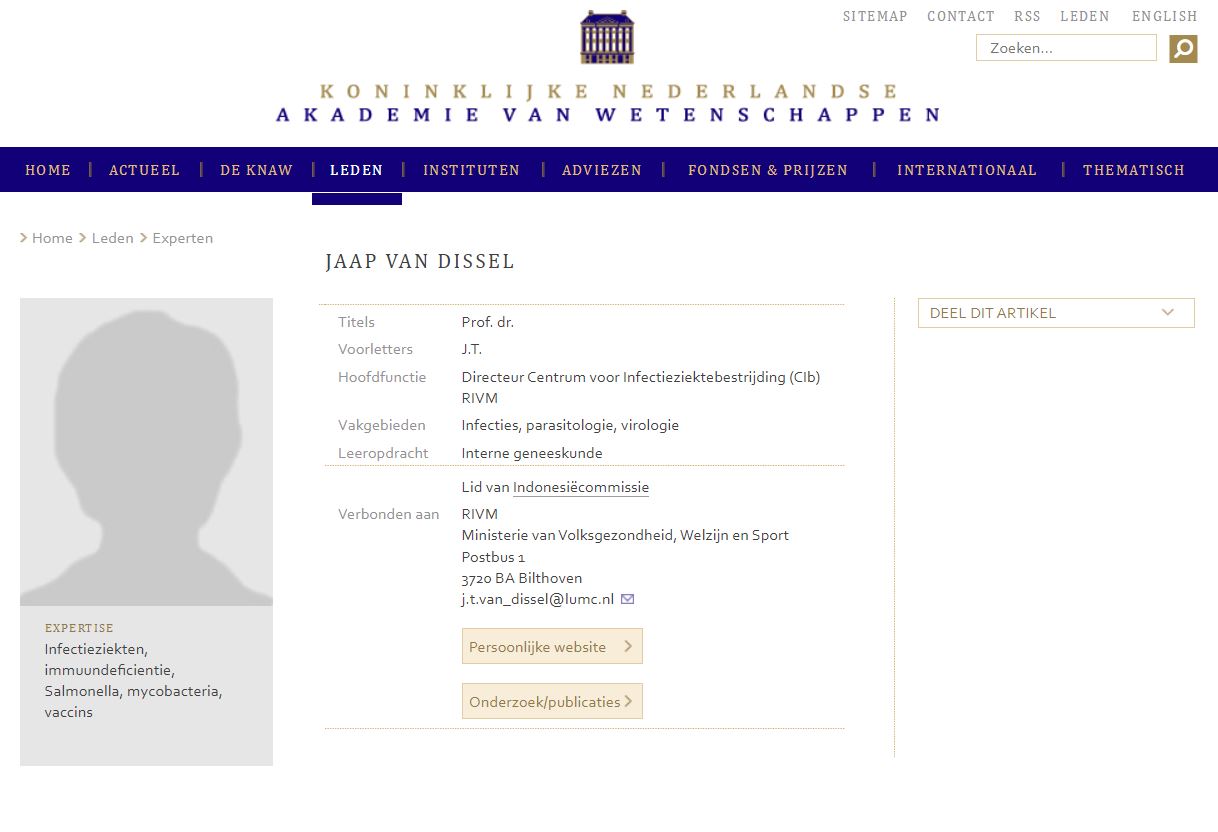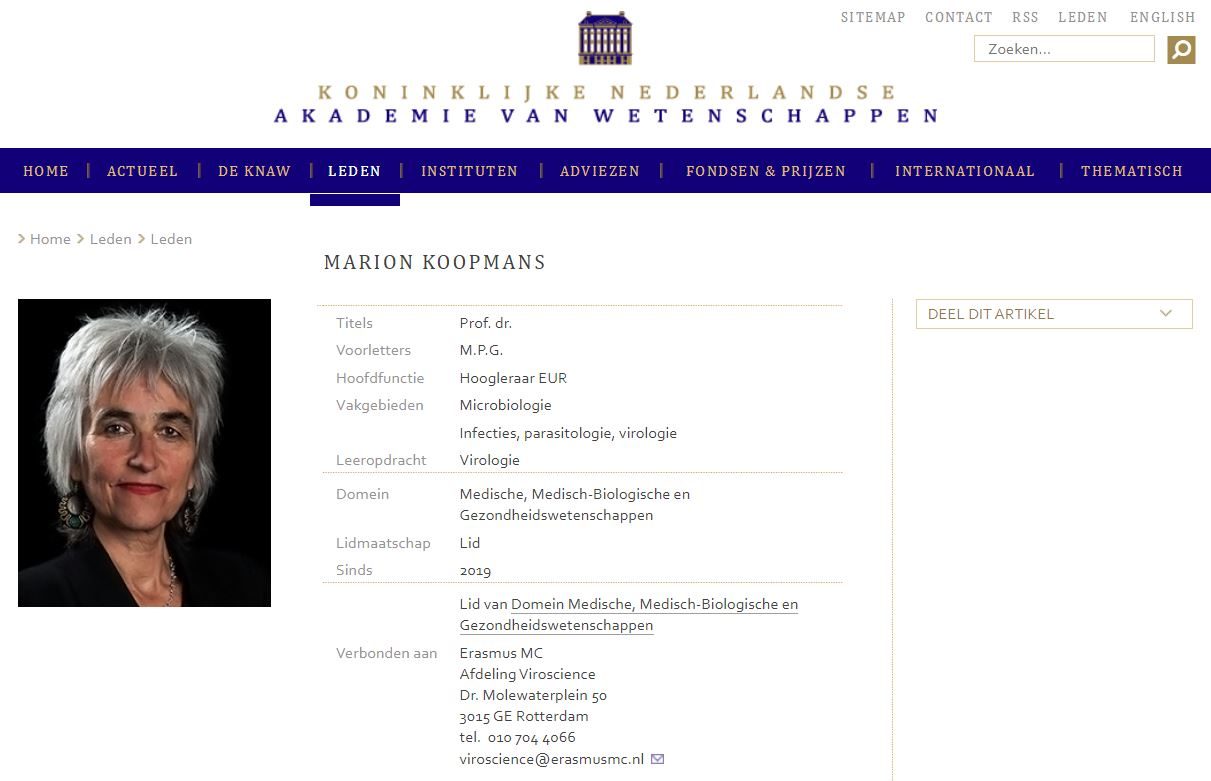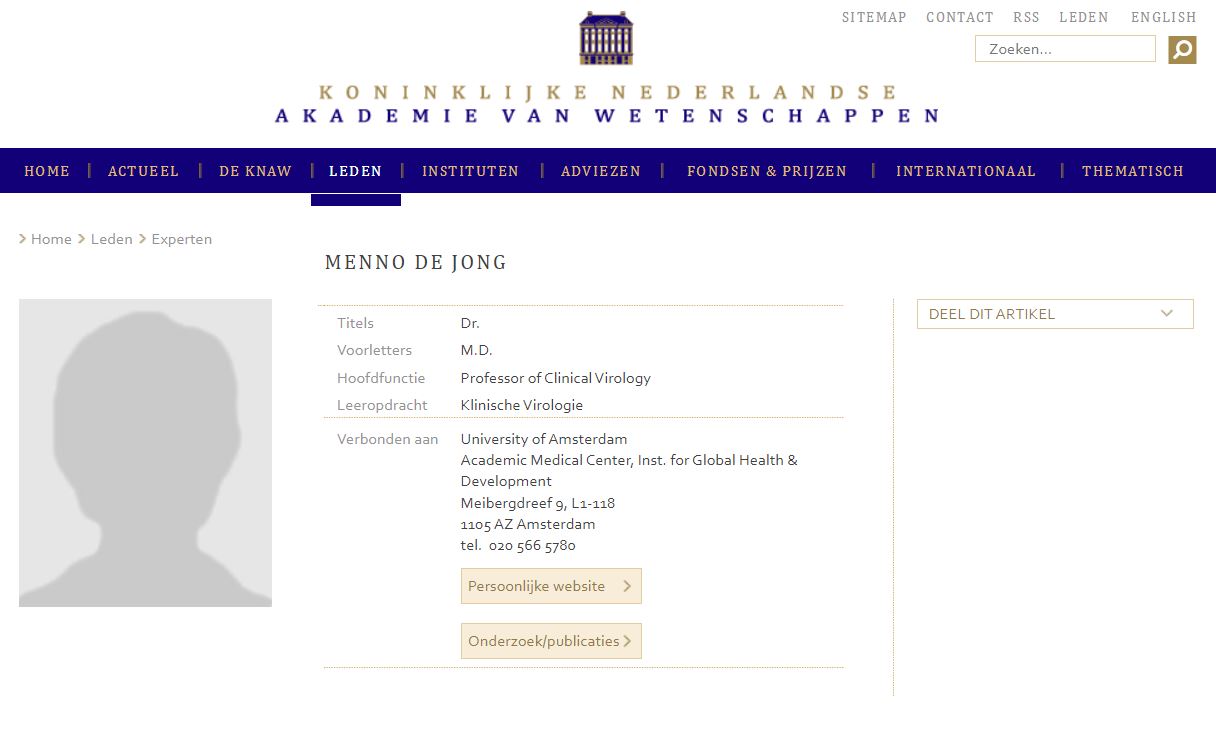Updated more recent article: https://virusvaria.nl/300-wetenschappers-verklaren-zich-solidair-met-onwetenschappelijk-handelen-niet-corrupt-wel-gecorrumpeerd/
On 31 May 2021, an amazing event took place: The Royal Netherlands Academy of Arts and Sciences awarded its medal of honour to someone who does not know the guidelines for academic integrity or systematically neglects them. These guidelines have been drawn up by the Royal Netherlands Academy of Arts and Sciences in collaboration with various other institutes. TheKNAWexpressly endorses the Dutch Code of Conduct for ScientificIntegrity2018 and may be considered its guardian.
The (medical) academic world allows itself many mistakes in this time of crisis and that brings science into disrepute. We lose the last beacon, the last objective glasses in the world (of course it always remains a pair of glasses).
But what is that, that Scientific Integrity? I have the KNAW's PDF I browsed through it because I could not place that medal of honor with my semesters of philosophy of science - in a gray past. I will highlight the key points; there is no need to discuss every paragraph in detail. I invite you to check for yourself whether the rivm has been as exemplary as the Academy makes it seem by allocating the medal of honour to rivm director van Dissel. Then you can see in the 'Reflections' open flippers what I think of it myself.
The five guiding principles of scientific integrity
The code of conduct is built on the core values:
- Honesty
- Carefulness
- Transparency
- Independence
- Responsibility
1. Honesty
"... that one does not make unsubstantiated claims, that one reports correctly about the research process, that one does not invent or falsify data or sources, that one takes alternative views and counterarguments seriously, that one is open about margins of uncertainty, and that one does not present results more favorably or unfavorably than they are."
Concerns about Honesty
- The claims that hand washing, a distance of one and a half meters (and face masks, although the latter does not so much come from the RIVM tube) work against the epidemic spread of respiratory diseases have been for decades. unsubstantiated basic principles.
- Sources are manufactured using obscure models. Not every model automatically gives an honest picture.
- Alternative views and counterarguments are ridiculed and downgraded on the basis of alleged authority. Even fellow knowledge institutes are ignored through the rivm.
- Inventories of reality and events in the near future are repeatedly - even systematically - presented more unfavourably than they actually are or turn out to be later.
- And let's be honest: is a vaccine really the only thing that helps against Covid?
2. Care
"... optimal precision in the design, execution, reporting and dissemination of research."
Concerns about Due Diligence
Just the up and down fluttering forecastsit confusing infections and positive tests, forgot it first and later: underestimating the seasonal effect virus transmission does not give the impression of great precision. If that is the optimal care that rivm is capable of, the question is justified how things stand with the other National Knowledge Institutes, which are now in the scientific shadow of the praised rivm.
3. Transparantie
"Transparency means, among other things, that it is clear to others on which data one has based themselves, how it was obtained, what results one has achieved and by what means, and what the role of external stakeholders has been."
Concerns about Transparency
- failure to comply with explicit disclosure requests
- do not answer specific parliamentary questions
- ignoring peers
- withholding predictive models such as black boxes
- mainly use data from external stakeholders
The blocking of data is only allowed if this has already been indicated and authenticated prior to the investigation, for example with regard to privacy-sensitive information. This is an exception to the strict obligation of transparency. This transparency is not honored. WOB requests are even sabotaged by Min. VWS.
In the House of Representatives, interest has repeatedly been shown in the underlying data and algorithms. Although this is not an officially requested integrity investigation, these are certainly questions that can concern integrity and should have been clearly answered for that reason alone in order to avoid any unwanted appearance.
4. Independence
"... is not guided by extra-scientific considerations (e.g. considerations of a commercial or political nature). Thus formulated, independence also includes impartiality.'
Concerns about Independence
Interests in test labs, in test lanes, co-authorship of recommended protocols to be applied worldwide, advisory functions at pharmaceutical companies and supervisory board members question marks over impartiality of the advice that the government receives. The rivm (and the OMT it compiles) is of course dependent on the flow of money from the government. It is therefore not inconceivable that a government narrative carries weight in the development of opinions. In the history here are previous examples of. We have also already seen how furious minister De Jonge reacts to too much doubt or curiosity about the decision-making of the rivm.
5. Responsibility
"Responsibility includes, among other things, taking into account the fact that as a researcher one does not operate in isolation, and therefore takes into account, within the limits of reasonableness, the legitimate interests of persons and animals involved in the research, of any clients and funders, and of the environment."
Concerns about Responsibility
The 'environment' is virtually limitless in the event of a supposed pandemic. In measures imposed on the population, the entire population is involved. It is not clear to what extent the research into effective measures has taken into account the population and the effects on public health, nor, for example, effects on the third world, to name but one. These considerations have been systematically shifted to 'politics'. The disaster scenarios predicted from all sides, impact assessmentsand Calculationseven in advance by officials of VWS – rivm should have been able to think of it or at least take it into consideration. At least after the first scare, from April/May 2020.
Later in the document there are other definitions and views against which - at least according to the public communication - has been sinned.
Negligence?
"In gross negligence, sloppy science ('questionable research practices') is more than just a mistake or carelessness, but an issue that also affects the integrity of scientific practice."
KNAW, Netherlands Code of Conduct for Research Integrity, 2018
Concerns about Negligence
It is a fact that since March 2020, false safety has been propagated with the mantra "wash hands and keep a distance of one and a half meters". Rivm failed to substantiate or falsify these socially radical regulations when they were questioned. The effectiveness of lockdowns is debatable to say the least (see the aforementioned report from the Ministry of Health, Welfare and Sport, the Gupta report and the video by Ivor Cummins), and lockdowns were an absolute no go until 2020, strongly discouraged by the WHO. The fact that the measures hardly work is not 'easy to say in retrospect'. Alert scientists knew this much earlier. There are already many scientific objections against the RIVM recommendations in April 2020. Just say from the moment that the KNMI started knocking on the rivm's door that something was really not correct in the basic assumptions of the measures. They were not heard. All that exclusion of new, potentially helpful information and scientific insights is very, very negligent.
Common excuses are: "You'll just be in that position and have to give advice" – "Do you never make mistakes" – "Yes they didn't mention that but they didn't mention more, you can't mention everything" – "They can't listen to the first dance teacher, can they?" – "People who criticize don't understand science" – "Maurice's predictions never come true, rightly so that they put it aside" – "They do mention ventilation, they really do not make people sick by advising the wrong protection" – "Yes predictions are sometimes wrong." – "A factor of 40 next to it? Where do you get that from, that's not at all said at Op1" – "It's an institution, isn't it? That's not just something!" etc. etc.
Duties of care
Under the heading "Duty of care" the following passage:
"The institution ensures that researchers can work in a safe, inclusive and open environment, in which they feel responsible and approachable, can share dilemmas and discuss mistakes made without fear of the consequences ('blame-free reporting')."
KNAW, Netherlands Code of Conduct for Research Integrity, 2018
Concerns about Duty of Care
Violation of scientific integrity, questionable behaviour or minor shortcoming
"In serious cases, non-compliance with one or more standards leads to a violation of scientific integrity: by the researcher and, where applicable, by the supervisor, project leader, research director or supervisor who has incited that non-compliance."
KNAW, Netherlands Code of Conduct for Research Integrity, 2018
The clearest examples of violation of scientific integrity are: fabricating, falsifying or plagiarism. Fabricating is making up data or research results and reporting on them as if they were real (standard 19 from chapter 3). Falsification is the manipulation of research material, equipment or processes to modify, withhold or delete data or research results without justification (standard 21). Plagiarism is the use without appropriate recognition of ideas, methods, results or texts of another.
Concerns about fabrication, falsification and plagiarism
- Models fabricate data, that's the whole idea of models. The algorithms used have often been asked. It seems that essential factors such as season and humidity were never taken into account (until a few weeks ago presumably, but that too is guesswork). This has led to the fabrication of incorrect policy-making data.
- The data from the models are nevertheless "real" enough to scare everyone. Orson Welle's 'War of the Worlds' was nothing. After all, it had to be made clear to the population that they really had to adhere to the guidelines. Yet it is precisely this that should be the task of politicians, not of the scientists.
Fear scenarios were hung out of the blue on various graphs, with predictions that were obviously wrong in the eyes of other scientists – and turned out to be so afterwards. Charts are adjusted retroactively including the previously forecasted margins. - Plagiarism is not crediting indebtedness. There are two important predecessors in the concept of aerosols in the Netherlands (Maurice De Hond and to a lesser extent Willem Engel). With the progressive insights of the rivm, they are never mentioned as a source reference or at least thank you for their signal function. That would be appropriate recognition be. Despite the fact that paragraphs on ventilation and aerosols are reluctantly inserted here and there, the measures are still virtually unchanged a year later. The insights on ventilation and aerosols, knowledge of 'outside', in a very unscientific way, are still subordinate to the rivm dogma©
Unexpected scope
The entire code of conduct assumes that a researcher or research group, perhaps a research leader, does not adhere to the code. Not for a moment is it taken into account that an entire institute is in a tube vision with a fear image that is supposed to justify violating scientific integrity. Then, of course, an internal whistleblower procedure does not work either, because the institutional board is also in charge of this.
'If it is assumed that the scientific integrity has been violated, a complaint may be lodged with a committee or official designated for that purpose by the institution. The institution shall ensure a careful and fair procedure for the handling of those complaints and subsequent decision-making. This procedure is also followed if the institutional board itself, independently of a complaint, deems it necessary to investigate possible violation of scientific integrity."
KNAW, Netherlands Code of Conduct for Research Integrity, 2018
The rivm is as closed as an oyster and preferably communicates with yes-marbles. Critical voices are avoided – and this code of conduct is also leading for the media. If recourse is sought from the judiciary in desperation, such a legal procedure usually takes long enough to create or amend an emergency law that closes any legal gap around a measure. A hermetic stronghold.
It's all systemic problems. Making mistakes is allowed, but the correction mechanisms are not good because they fail one after the other: Maintaining scientific integrity, the controlling task of the House of Representatives, critical and difficult media. And maybe the judiciary will too. I did not want to let this festive occasion, the presentation of the Medal of Honour by the Academy to Jaap van Dissel, pass by without mentioning this again.
The Academy is responsible for ten national research institutes and three institutes that provide infrastructure for research. They work in the fields of the humanities, the social sciences and the life sciences. The rivm is not among those ten. It makes one think how the responsibility for those 10 institutions is understood, if the ruthless obstinacy of Jaap van Dissel is celebrated in this way. A responsible wash.
[Addendum, October 26, 2021:]
Does rivm not have a Supervisor? Yes, it is. Nominated by – yes, the KNAW and the Ministry of Health, Welfare and Sport. How can that supervise each other, if they all serve the same interest, why is everything so intertwined? They give each other prizes! Why independent? There's something shameless about it. The dedain is despondent.

Would it make sense to file a complaint with the LOWI?

Just ask.
From: anton@antcommunications.nl <anton@antcommunications.nl>
Sent: saturday 15 january 2022 16:55
To: Secretariat Lowi <secretariaat@lowi.nl>
Subject: General questions about Scientific Integrity
L.S.,
Can you refer me to documentation from which I can understand that the scientific integrity of various institutes has not been compromised during the corona crisis? Maybe you have taken (unnoticed) action on it or maybe you cannot take action without 'complaint', in that case I would like to hear that.
For example, I would like to know whether, if a scientific institute obviously violates guidelines, there are any repercussions? Is it 'enforced' and what happens if the enforcer is entangled with the offender? What if a ministry and 'its' knowledge institutes violate those guidelines in the name of 'science'?
You probably already understand where this is going. I expressed my concerns in a blog article on 31 May last year: https://virusvaria.nl/knaw/
This e-mail will not be admissible as a formal complaint and is not intended as such. However, the (what I see as) violations of scientific integrity have had catastrophic consequences for society and for the stature of science in particular. It seems to me that you should also take that into your heart; it goes to the heart of what your Foundation is intended for. It seems to me highly necessary that the supervision of W.I. is better regulated and monitored.
Hopefully you want to think about this as well. I'd love to hear from you.
Sincerely,
Drs. A.E.J.C. Theunissen
From: Secretariat Lowi <secretariaat@lowi.nl>
Sent: thursday 27 january 2022 12:57
At: ‘anton@antcommunications.nl’ <anton@antcommunications.nl>
Cc: Secretariat Lowi <secretariaat@lowi.nl>; Judith Zweistra <judith.zweistra@lowi.nl>
Subject: RE: General questions about Scientific Integrity
Dear Mr. Theunissen,
I hereby acknowledge receipt of your e-mail of 15 January.
I understand that you have questions about the scientific integrity at institutes during the Corona crisis.
As you yourself point out in your e-mail, the LOWI advisory committee is indeed not authorised to advise or conduct research on its own initiative. Only at the request of a party in a specific complaints procedure does the LOWI issue advice on scientific integrity. An institutional board then gives a final opinion on whether a scientist has violated scientific integrity or not.
The LOWI can therefore not answer your questions.
I trust that I have informed you sufficiently.
Sincerely,
Judith Zweistra
official secretary LOWI
National Body for Scientific Integrity (LOWI)
The Trippenhuis
P.O. Box 19121
NL-1000 GC Amsterdam
www.lowi.nl
From: anton@antcommunications.nl
Sent: thursday 27 january 2022 14:57
At: "Secretariat Lowi"
Subject: RE: General questions about Scientific Integrity
Dear Mrs Zwelstra,
Thank you very much for your reply. Indeed, I had already expected this answer a bit. I was hoping for a moral compass against my better judgment.
You may understand that I do not see a gap in filing a complaint with the RIVM or with the Ministry of Health, Welfare and Sport. Even WOB requests, parliamentary questions and court rulings are ignored by these institutes. That too is widely accepted, so it seems to me to be a hopeless action.
It's no different.
Sincerely,
Anton Theunissen
Virusvaria.nl





0 reactions
Trackbacks/Pingbacks